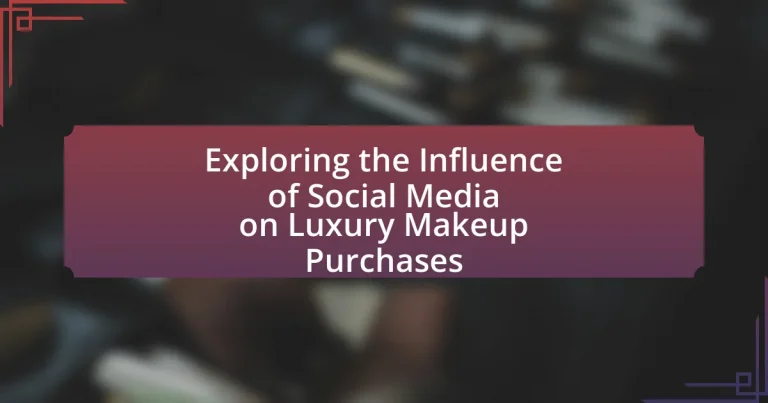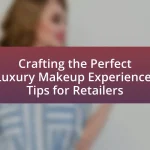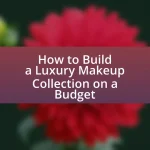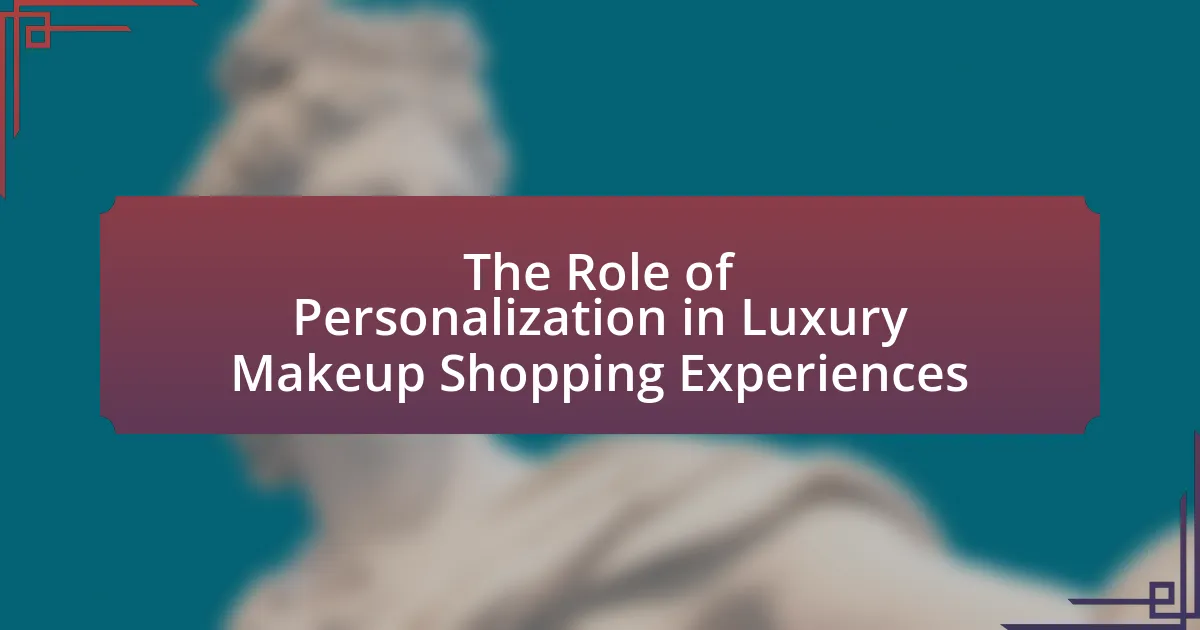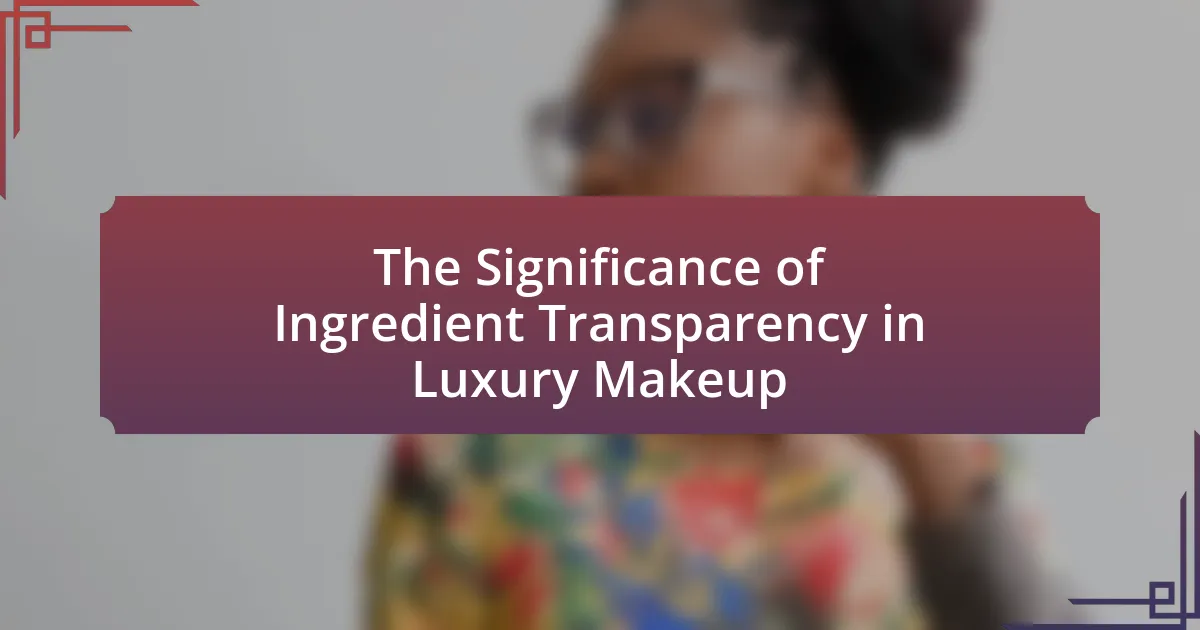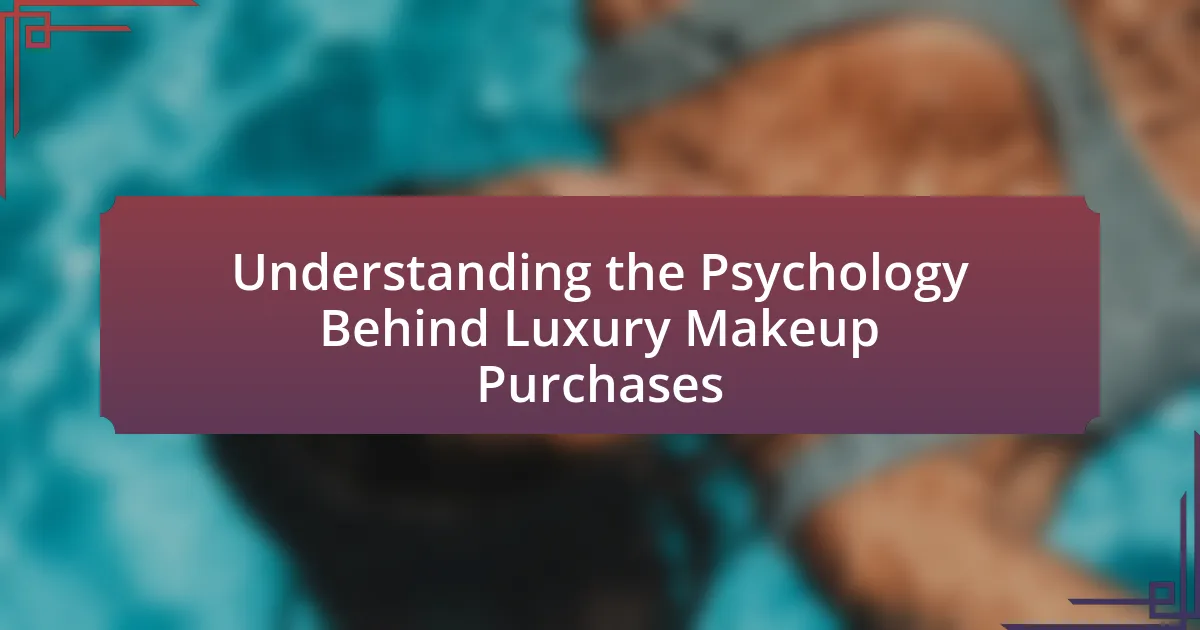The article examines the significant influence of social media on luxury makeup purchases, highlighting how platforms like Instagram and TikTok shape consumer perceptions and drive brand engagement. It discusses the role of influencers in shaping purchasing decisions, the importance of user-generated content, and the impact of demographic factors on consumer behavior. Key trends in social media marketing, such as immersive experiences and the use of augmented reality, are explored, alongside best practices for luxury makeup brands to enhance their online presence and measure campaign success effectively. The article underscores the necessity for brands to adapt their strategies to different demographics to maximize engagement and sales in the competitive luxury makeup market.
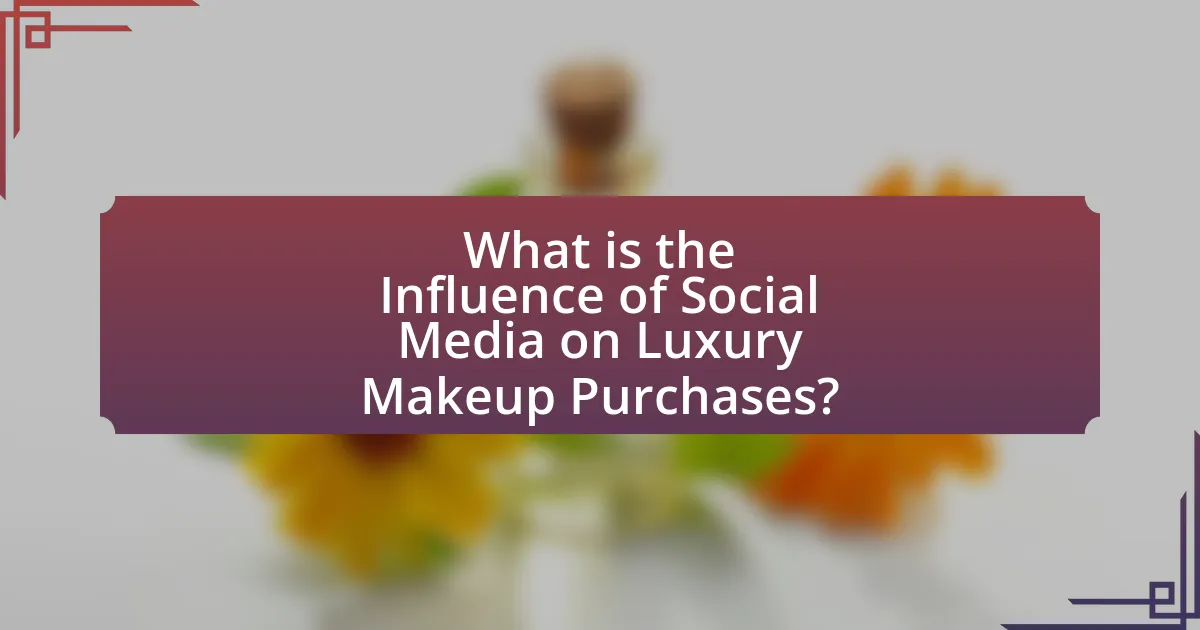
What is the Influence of Social Media on Luxury Makeup Purchases?
Social media significantly influences luxury makeup purchases by shaping consumer perceptions and driving brand engagement. Platforms like Instagram and TikTok serve as visual marketing tools, where influencers showcase luxury products, leading to increased desirability and purchase intent among followers. A study by McKinsey & Company found that 70% of millennials are influenced by social media when making purchasing decisions, highlighting the platform’s role in shaping consumer behavior in the luxury makeup sector. Additionally, the rise of user-generated content and beauty tutorials on these platforms enhances brand visibility and credibility, further driving sales in the luxury makeup market.
How has social media changed consumer behavior in the luxury makeup market?
Social media has significantly transformed consumer behavior in the luxury makeup market by enhancing brand visibility and fostering direct engagement between brands and consumers. Platforms like Instagram and TikTok allow luxury makeup brands to showcase products through visually appealing content, which influences purchasing decisions; for instance, a study by McKinsey & Company found that 70% of consumers are influenced by social media when making purchasing decisions. Additionally, user-generated content and influencer partnerships create a sense of authenticity and relatability, leading to increased trust and loyalty among consumers. This shift towards social media-driven marketing has resulted in a more informed and engaged consumer base, ultimately driving sales in the luxury makeup sector.
What role do influencers play in shaping luxury makeup purchasing decisions?
Influencers significantly shape luxury makeup purchasing decisions by leveraging their credibility and reach to impact consumer behavior. Research indicates that 49% of consumers rely on influencer recommendations when making luxury purchases, highlighting their persuasive power. Influencers create aspirational content that showcases luxury products, often leading to increased brand awareness and consumer interest. Additionally, their ability to engage with followers through authentic storytelling fosters trust, which is crucial in the luxury market where consumers seek validation before making high-value purchases.
How do social media platforms facilitate luxury makeup brand visibility?
Social media platforms enhance luxury makeup brand visibility by providing targeted advertising, influencer partnerships, and user-generated content. These platforms allow brands to reach specific demographics through tailored ads, which can increase engagement and brand awareness. For instance, Instagram’s advertising tools enable luxury makeup brands to showcase products to users based on their interests and behaviors, resulting in higher conversion rates. Additionally, collaborations with beauty influencers amplify brand exposure, as influencers often have large, engaged followings that trust their recommendations. Research indicates that 49% of consumers rely on influencer recommendations when making purchase decisions, highlighting the effectiveness of this strategy. Furthermore, user-generated content, such as customer reviews and makeup tutorials, fosters community engagement and authenticity, further solidifying brand visibility in a competitive market.
Why is social media engagement important for luxury makeup brands?
Social media engagement is crucial for luxury makeup brands because it enhances brand visibility and fosters customer loyalty. Engaging with consumers on platforms like Instagram and TikTok allows these brands to showcase their products in visually appealing ways, which is essential in the beauty industry where aesthetics drive purchasing decisions. According to a study by McKinsey, 70% of consumers are influenced by social media when making purchasing decisions, highlighting the importance of maintaining an active online presence. Furthermore, high engagement rates can lead to increased brand trust and authenticity, as consumers feel more connected to brands that interact with them directly. This connection can ultimately translate into higher sales and customer retention for luxury makeup brands.
What metrics indicate successful social media engagement for luxury makeup brands?
Successful social media engagement for luxury makeup brands is indicated by metrics such as engagement rate, reach, and conversion rate. The engagement rate, which measures likes, comments, and shares relative to total followers, reflects how well content resonates with the audience; a higher engagement rate typically signifies effective communication and brand loyalty. Reach, the total number of unique users who see the content, is crucial for brand visibility and awareness, especially in a competitive luxury market. Conversion rate, the percentage of users who take a desired action (like making a purchase) after engaging with social media content, directly correlates to sales effectiveness and the impact of social media campaigns. These metrics collectively provide a comprehensive view of a luxury makeup brand’s social media performance and its influence on consumer purchasing behavior.
How do luxury makeup brands leverage user-generated content on social media?
Luxury makeup brands leverage user-generated content (UGC) on social media by encouraging customers to share their experiences and showcasing these authentic interactions to enhance brand credibility and engagement. By reposting customer photos, reviews, and tutorials, brands create a sense of community and trust, which is crucial in the luxury market where authenticity is valued. For instance, brands like Fenty Beauty and Glossier have successfully utilized UGC to drive engagement, with Fenty Beauty reporting that 70% of their social media content comes from users. This strategy not only amplifies brand visibility but also fosters a deeper emotional connection with consumers, ultimately influencing purchasing decisions.
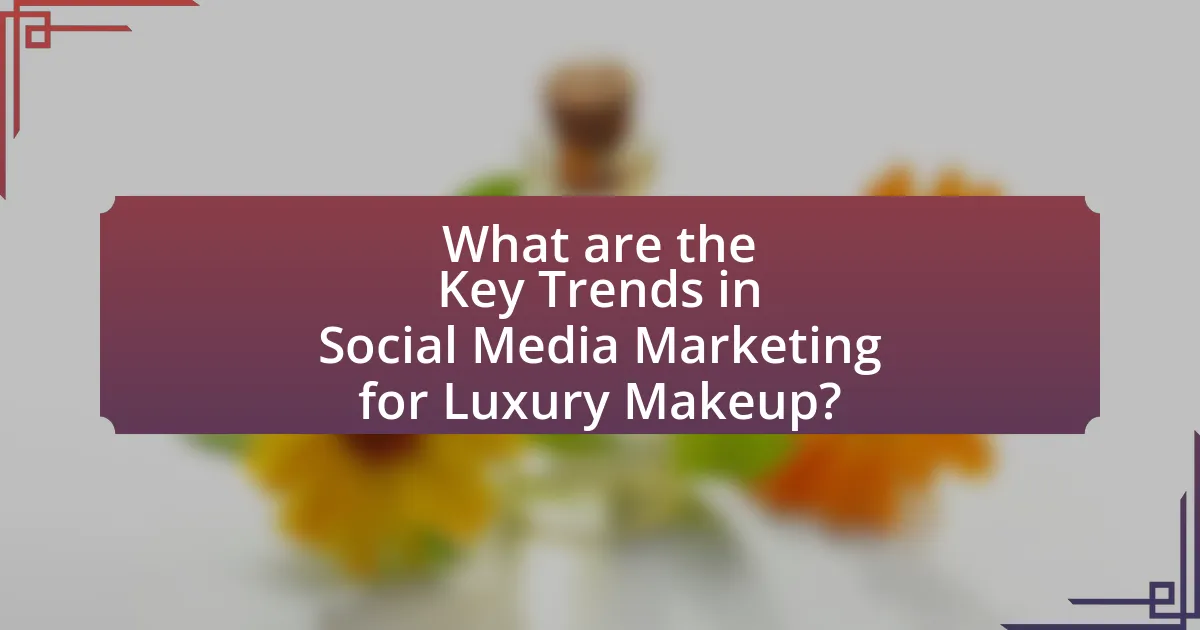
What are the Key Trends in Social Media Marketing for Luxury Makeup?
Key trends in social media marketing for luxury makeup include influencer collaborations, user-generated content, and immersive experiences through augmented reality. Influencer collaborations leverage the reach and credibility of beauty influencers, driving brand awareness and consumer trust; for instance, brands like Fenty Beauty have successfully partnered with diverse influencers to enhance their market presence. User-generated content encourages customers to share their experiences, fostering community engagement and authenticity, as seen with brands like Glossier, which actively promotes customer posts. Additionally, immersive experiences utilizing augmented reality, such as virtual try-ons, enhance consumer interaction and decision-making, exemplified by brands like L’Oréal, which have integrated AR features into their social media platforms. These trends reflect the evolving landscape of luxury makeup marketing, emphasizing personalization and community engagement.
How do visual platforms like Instagram impact luxury makeup purchases?
Visual platforms like Instagram significantly influence luxury makeup purchases by enhancing brand visibility and consumer engagement. The platform’s visual nature allows brands to showcase products through high-quality images and videos, which can lead to increased consumer interest and desire. Research indicates that 72% of Instagram users have purchased a product they saw on the platform, highlighting its effectiveness in driving sales. Additionally, influencer marketing on Instagram plays a crucial role, as endorsements from beauty influencers can create a sense of trust and authenticity, further motivating consumers to make luxury purchases.
What types of content resonate most with luxury makeup consumers on social media?
Luxury makeup consumers on social media resonate most with high-quality visual content, including professional makeup tutorials, influencer endorsements, and aesthetically pleasing product showcases. Research indicates that 70% of luxury consumers are influenced by visual content on platforms like Instagram and TikTok, where they seek inspiration and validation for their purchases. Additionally, user-generated content, such as authentic reviews and unboxing experiences, significantly impacts their buying decisions, as it fosters trust and relatability.
How do hashtags and trends influence luxury makeup buying behavior?
Hashtags and trends significantly influence luxury makeup buying behavior by enhancing visibility and creating a sense of urgency among consumers. When luxury makeup brands utilize popular hashtags, they increase their reach on social media platforms, attracting potential buyers who are searching for specific products or trends. For instance, a study by the Journal of Business Research found that 79% of consumers are more likely to purchase a product after seeing it promoted through social media hashtags. Additionally, trends often create a bandwagon effect, where consumers feel compelled to buy products that are currently popular or endorsed by influencers, further driving sales in the luxury makeup sector.
What emerging technologies are shaping social media marketing in luxury makeup?
Emerging technologies shaping social media marketing in luxury makeup include augmented reality (AR), artificial intelligence (AI), and influencer marketing platforms. AR enables virtual try-ons, allowing consumers to visualize products on themselves before purchase, which enhances engagement and reduces return rates. AI algorithms analyze consumer behavior and preferences, enabling personalized marketing strategies that increase conversion rates. Additionally, influencer marketing platforms facilitate collaborations with beauty influencers, leveraging their reach to target specific demographics effectively. These technologies collectively enhance customer experience and drive sales in the luxury makeup sector.
How does augmented reality enhance the luxury makeup shopping experience on social media?
Augmented reality enhances the luxury makeup shopping experience on social media by allowing users to virtually try on products before purchasing. This technology provides an interactive and immersive experience, enabling consumers to see how different makeup products look on their own faces in real-time. According to a study by the National Retail Federation, 61% of consumers prefer retailers that offer augmented reality experiences, indicating a strong preference for this technology in the shopping process. By integrating augmented reality, luxury brands can increase customer engagement, reduce return rates, and ultimately drive sales, as users feel more confident in their purchasing decisions when they can visualize the products on themselves.
What is the impact of live streaming on luxury makeup sales through social media?
Live streaming significantly boosts luxury makeup sales through social media by enhancing consumer engagement and providing real-time product demonstrations. This interactive format allows brands to showcase their products in a dynamic way, leading to increased viewer interest and immediate purchasing decisions. For instance, a study by McKinsey & Company found that live streaming can increase conversion rates by up to 30% compared to traditional marketing methods. Additionally, platforms like Instagram and TikTok report that brands utilizing live streaming see higher audience retention and interaction, which translates into increased sales.
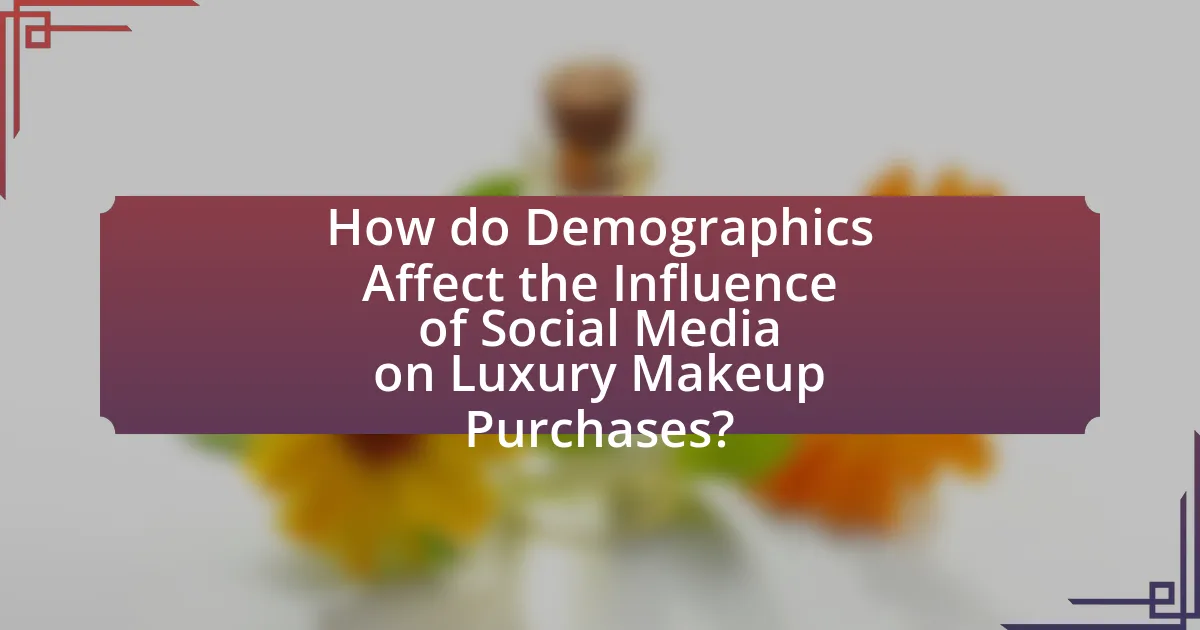
How do Demographics Affect the Influence of Social Media on Luxury Makeup Purchases?
Demographics significantly influence the impact of social media on luxury makeup purchases, as factors such as age, gender, income, and cultural background shape consumer behavior and preferences. For instance, younger consumers, particularly those aged 18-34, are more likely to engage with beauty influencers on platforms like Instagram and TikTok, leading to higher purchase intent for luxury makeup brands. A study by McKinsey & Company found that millennials and Gen Z account for over 60% of luxury purchases, highlighting their reliance on social media for product discovery and validation. Additionally, women, who traditionally dominate the luxury makeup market, are more influenced by social media marketing strategies, such as user-generated content and influencer endorsements, compared to men. Income levels also play a crucial role, as higher-income individuals are more likely to follow luxury brands on social media and make purchases based on online recommendations. Thus, demographic factors create distinct patterns in how social media influences luxury makeup buying decisions.
What demographic factors influence luxury makeup purchasing decisions on social media?
Demographic factors that influence luxury makeup purchasing decisions on social media include age, gender, income level, and education. Research indicates that younger consumers, particularly those aged 18 to 34, are more likely to engage with luxury makeup brands on social media platforms, driven by trends and influencer endorsements. Gender plays a significant role, as women are the primary consumers of luxury makeup, with studies showing that 85% of luxury beauty purchases are made by females. Income level is crucial, as higher disposable income correlates with increased spending on luxury products; for instance, individuals with an annual income exceeding $75,000 are more inclined to purchase luxury makeup. Additionally, education level influences purchasing behavior, with college-educated consumers demonstrating a greater propensity to invest in premium beauty products, often due to increased awareness of brand value and quality.
How do age and gender differences affect engagement with luxury makeup brands on social media?
Age and gender differences significantly affect engagement with luxury makeup brands on social media, as younger consumers, particularly women aged 18-34, are more active on platforms like Instagram and TikTok, where visual content thrives. Research indicates that this demographic is more likely to follow beauty influencers and engage with brand content, leading to higher interaction rates. In contrast, older consumers, especially men, tend to engage less frequently with luxury makeup brands on social media, often preferring traditional advertising methods. A study by the Pew Research Center shows that 71% of younger adults use Instagram, compared to only 35% of those aged 50 and older, highlighting the disparity in platform usage and engagement levels across age groups.
What role does geographic location play in luxury makeup purchasing via social media?
Geographic location significantly influences luxury makeup purchasing via social media by affecting consumer access, preferences, and purchasing power. For instance, consumers in urban areas with higher disposable incomes are more likely to engage with luxury brands on social media platforms, leading to increased purchases. Additionally, cultural factors tied to specific regions can shape beauty standards and preferences, impacting which luxury products are promoted and purchased. Research indicates that markets in North America and Europe show a higher propensity for luxury makeup consumption compared to emerging markets, where social media strategies may need to be tailored to local tastes and economic conditions.
How can luxury makeup brands tailor their social media strategies to different demographics?
Luxury makeup brands can tailor their social media strategies to different demographics by analyzing the preferences and behaviors of each target group. For instance, younger consumers, particularly Gen Z, prefer platforms like TikTok and Instagram, where visual content and influencer collaborations drive engagement. In contrast, older demographics may respond better to Facebook and Pinterest, where informative content and community engagement are more prevalent.
Research indicates that 62% of Gen Z consumers are influenced by social media when making beauty purchases, highlighting the importance of targeted campaigns on platforms they frequent. Additionally, luxury brands can utilize data analytics to segment their audience based on age, interests, and purchasing behavior, allowing for personalized content that resonates with each demographic. By aligning their messaging and content style with the values and preferences of each group, luxury makeup brands can enhance their social media effectiveness and drive sales.
What specific strategies work best for targeting millennials and Gen Z in luxury makeup marketing?
The best strategies for targeting millennials and Gen Z in luxury makeup marketing include leveraging social media influencers, creating engaging and authentic content, and utilizing interactive platforms. Social media influencers, particularly those with a strong following among these demographics, can effectively promote luxury makeup brands, as 70% of millennials and Gen Z trust influencer recommendations over traditional advertising. Engaging content that resonates with their values, such as sustainability and inclusivity, is crucial; for instance, brands that showcase diverse models and eco-friendly practices see higher engagement rates. Additionally, interactive platforms like TikTok and Instagram Stories allow brands to create immersive experiences, with 54% of Gen Z preferring brands that offer interactive content. These strategies align with the preferences and behaviors of millennials and Gen Z, making them effective in luxury makeup marketing.
How can luxury makeup brands address the preferences of older consumers on social media?
Luxury makeup brands can address the preferences of older consumers on social media by creating targeted content that resonates with their values and needs. This includes showcasing products that emphasize skincare benefits, as older consumers often prioritize anti-aging properties and skin health. Additionally, brands should utilize platforms like Facebook and Instagram, where older demographics are increasingly active, to share tutorials and testimonials that highlight the effectiveness of their products for mature skin. Research indicates that 60% of adults aged 50 and older use social media, making it essential for brands to engage this audience through relatable messaging and community-building initiatives.
What are Best Practices for Luxury Makeup Brands on Social Media?
Luxury makeup brands should prioritize high-quality visual content, engage with their audience authentically, and leverage influencer partnerships on social media. High-quality visuals, such as professional photography and videos, are essential as they reflect the brand’s premium image and attract attention; for instance, brands like Chanel and Dior consistently use striking imagery to showcase their products. Authentic engagement involves responding to comments and messages, which fosters a community and builds brand loyalty; research indicates that brands that actively engage with their followers see a 20% increase in customer retention. Additionally, collaborating with influencers who align with the brand’s values can expand reach and credibility, as studies show that 70% of millennials trust influencer recommendations over traditional advertising.
What strategies can luxury makeup brands implement to enhance their social media presence?
Luxury makeup brands can enhance their social media presence by leveraging influencer partnerships, creating high-quality visual content, and engaging with their audience through interactive features. Influencer partnerships allow brands to tap into established audiences, as seen with brands like Fenty Beauty, which successfully collaborated with diverse influencers to reach a broader demographic. High-quality visual content, including professional makeup tutorials and aesthetically pleasing product photography, captures attention and encourages sharing, as evidenced by brands that consistently post visually appealing content seeing higher engagement rates. Additionally, utilizing interactive features such as polls, Q&A sessions, and live streams fosters community engagement and builds brand loyalty, which is crucial in the luxury market where personal connection is key.
How can luxury makeup brands effectively measure the success of their social media campaigns?
Luxury makeup brands can effectively measure the success of their social media campaigns by analyzing key performance indicators (KPIs) such as engagement rates, conversion rates, and return on investment (ROI). Engagement rates, which include likes, shares, comments, and overall interaction with posts, provide insight into how well the content resonates with the audience. Conversion rates track the percentage of users who take a desired action, such as making a purchase after interacting with a social media post, indicating the effectiveness of the campaign in driving sales. Additionally, calculating ROI involves comparing the revenue generated from social media efforts against the costs incurred, allowing brands to assess the financial impact of their campaigns. According to a report by Hootsuite, brands that actively monitor these metrics can increase their social media ROI by up to 30%, demonstrating the importance of data-driven strategies in evaluating campaign success.
